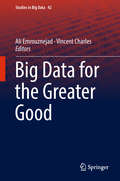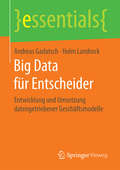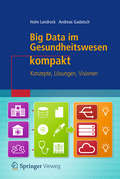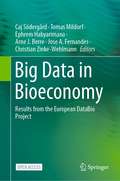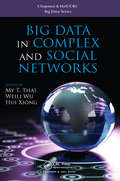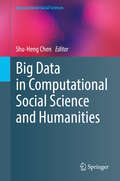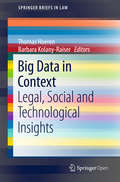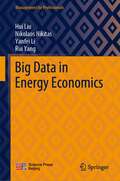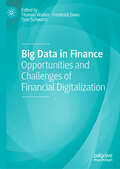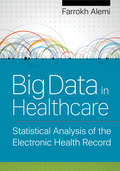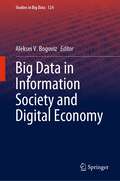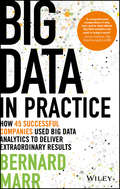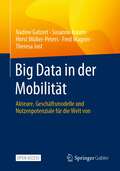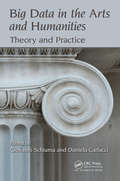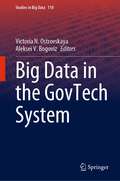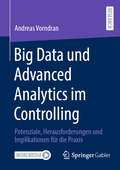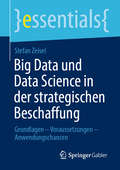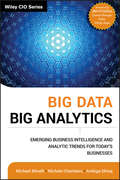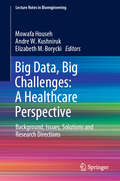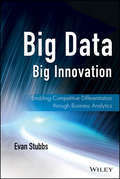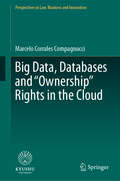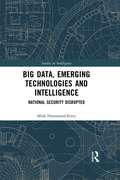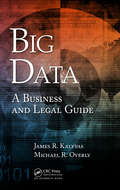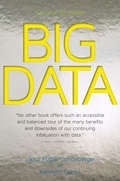- Table View
- List View
Big Data for the Greater Good (Studies in Big Data #42)
by Ali Emrouznejad Vincent CharlesThis book highlights some of the most fascinating current uses, thought-provoking changes, and biggest challenges that Big Data means for our society. The explosive growth of data and advances in Big Data analytics have created a new frontier for innovation, competition, productivity, and well-being in almost every sector of our society, as well as a source of immense economic and societal value. From the derivation of customer feedback-based insights to fraud detection and preserving privacy; better medical treatments; agriculture and food management; and establishing low-voltage networks – many innovations for the greater good can stem from Big Data. Given the insights it provides, this book will be of interest to both researchers in the field of Big Data, and practitioners from various fields who intend to apply Big Data technologies to improve their strategic and operational decision-making processes.
Big Data für Entscheider: Entwicklung und Umsetzung datengetriebener Geschäftsmodelle (essentials)
by Andreas Gadatsch Holm LandrockAndreas Gadatsch und Holm Landrock zeigen an typischen Beispielen aus der Praxis, wie datengetriebene Geschäftsmodelle entstehen. Sie erläutern, wie sich Big-Data-Projekte rechnen und wie man am einfachsten an die Analyse großer Datenmengen herangeht. Eine Bewertung der zentralen Aspekte von Projekten und der dort eingesetzten Technologien erleichtert den Lesern die tägliche Praxis im IT-Management. Die Autoren stellen Hadoop als eine der wichtigen Big-Data-Technologien vor.
Big Data im Gesundheitswesen kompakt: Konzepte, Lösungen, Visionen (It Kompakt Ser.)
by Andreas Gadatsch Holm LandrockDas kompakte Fachbuch gibt einen Überblick über die Möglichkeiten von „Big Data“ im Gesundheitswesen und beschreibt anhand von ausgewählten Szenarien mögliche Einsatzgebiete.Die Autoren erläutern zentrale Systemkomponenten und IT-Standards und thematisieren anhand wichtiger Daten des Gesundheitswesens die Notwendigkeit der Strukturierung und Modellierung von Daten. Das Buch gibt Hinweise wie Geschäftsprozesse im Gesundheitswesen dokumentiert, analysiert und verbessert werden können. Anwendungsszenarien, wie die Datenanalysen für Krankenhäuser, Labore, Versicherungen und die Pharmaindustrie, zeigen die praktische Relevanz des Themas. Aber auch rechtliche und ethische Aspekte werden inhaltlich angeschnitten.Ein Buch für Entscheider in der medizinischen Leitung und Verwaltung von Krankenhäusern, Fachleute sowie niedergelassene Ärzte und Apotheker, aber auch Personen in Ausbildung und Studium im Gesundheitswesen.
Big Data in Bioeconomy: Results from the European DataBio Project
by Christian Zinke-Wehlmann Caj Södergård Tomas Mildorf Ephrem Habyarimana Arne J. Berre Jose A. FernandesThis edited open access book presents the comprehensive outcome of The European DataBio Project, which examined new data-driven methods to shape a bioeconomy. These methods are used to develop new and sustainable ways to use forest, farm and fishery resources. As a European initiative, the goal is to use these new findings to support decision-makers and producers – meaning farmers, land and forest owners and fishermen.With their 27 pilot projects from 17 countries, the authors examine important sectors and highlight examples where modern data-driven methods were used to increase sustainability. How can farmers, foresters or fishermen use these insights in their daily lives? The authors answer this and other questions for our readers. The first four parts of this book give an overview of the big data technologies relevant for optimal raw material gathering. The next three parts put these technologies into perspective, by showing useable applications from farming, forestry and fishery. The final part of this book gives a summary and a view on the future.With its broad outlook and variety of topics, this book is an enrichment for students and scientists in bioeconomy, biodiversity and renewable resources.
Big Data in Complex and Social Networks (Chapman & Hall/CRC Big Data Series)
by My T. Thai, Weili Wu, Hui XiongThis book presents recent developments on the theoretical, algorithmic, and application aspects of Big Data in Complex and Social Networks. The book consists of four parts, covering a wide range of topics. The first part of the book focuses on data storage and data processing. It explores how the efficient storage of data can fundamentally support intensive data access and queries, which enables sophisticated analysis. It also looks at how data processing and visualization help to communicate information clearly and efficiently. The second part of the book is devoted to the extraction of essential information and the prediction of web content. The book shows how Big Data analysis can be used to understand the interests, location, and search history of users and provide more accurate predictions of User Behavior. The latter two parts of the book cover the protection of privacy and security, and emergent applications of big data and social networks. It analyzes how to model rumor diffusion, identify misinformation from massive data, and design intervention strategies. Applications of big data and social networks in multilayer networks and multiparty systems are also covered in-depth.
Big Data in Computational Social Science and Humanities (Computational Social Sciences)
by Shu-Heng ChenThis edited volume focuses on big data implications for computational social science and humanities from management to usage. The first part of the book covers geographic data, text corpus data, and social media data, and exemplifies their concrete applications in a wide range of fields including anthropology, economics, finance, geography, history, linguistics, political science, psychology, public health, and mass communications. The second part of the book provides a panoramic view of the development of big data in the fields of computational social sciences and humanities. The following questions are addressed: why is there a need for novel data governance for this new type of data?, why is big data important for social scientists?, and how will it revolutionize the way social scientists conduct research? With the advent of the information age and technologies such as Web 2.0, ubiquitous computing, wearable devices, and the Internet of Things, digital society has fundamentally changed what we now know as "data", the very use of this data, and what we now call "knowledge". Big data has become the standard in social sciences, and has made these sciences more computational. Big Data in Computational Social Science and Humanities will appeal to graduate students and researchers working in the many subfields of the social sciences and humanities.
Big Data in Context: Legal, Social and Technological Insights (SpringerBriefs in Law)
by Thomas Hoeren Barbara Kolany-RaiserThis book is open access under a CC BY 4. 0 license. This book sheds new light on a selection of big data scenarios from an interdisciplinary perspective. It features legal, sociological and economic approaches to fundamental big data topics such as privacy, data quality and the ECJ's Safe Harbor decision on the one hand, and practical applications such as smart cars, wearables and web tracking on the other. Addressing the interests of researchers and practitioners alike, it provides a comprehensive overview of and introduction to the emerging challenges regarding big data. All contributions are based on papers submitted in connection with ABIDA (Assessing Big Data), an interdisciplinary research project exploring the societal aspects of big data and funded by the German Federal Ministry of Education and Research. This volume was produced as a part of the ABIDA project (Assessing Big Data, 01IS15016A-F). ABIDA is a four-year collaborative project funded by the Federal Ministry of Education and Research. However the views and opinions expressed in this book reflect only the authors' point of view and not necessarily those of all members of the ABIDA project or the Federal Ministry of Education and Research.
Big Data in Energy Economics (Management for Professionals)
by Rui Yang Hui Liu Yanfei Li Nikolaos NikitasThis book combines energy economics and big data modeling analysis in energy conversion and management and comprehensively introduces the relevant theories, key technologies, and application examples of the smart energy economy. With the help of time series big data modeling results, energy economy managers develop reasonable and feasible pricing mechanisms of electricity price and improve the absorption capacity of the power grid. In addition, they also carry out scientific power equipment scheduling and cost–benefit analysis according to the results of data mining, so as to avoid the loss caused by accidental damage of equipment. Energy users adjust their power consumption behavior through the modeling results provided and achieve the effect of energy saving and emission reduction while reasonably reducing the electricity expenditure.This book provides an important reference for professionals in related fields such as smart energy, smart economy, energy Internet, artificial intelligence, energy economics and policy.
Big Data in Finance: Opportunities and Challenges of Financial Digitalization
by Thomas Walker Tyler Schwartz Frederick DavisThis edited book explores the unique risks, opportunities, challenges, and societal implications associated with big data developments within the field of finance. While the general use of big data has been the subject of frequent discussions, this book will take a more focused look at big data applications in the financial sector. With contributions from researchers, practitioners, and entrepreneurs involved at the forefront of big data in finance, the book discusses technological and business-inspired breakthroughs in the field. The contributions offer technical insights into the different applications presented and highlight how these new developments may impact and contribute to the evolution of the financial sector. Additionally, the book presents several case studies that examine practical applications of big data in finance. In exploring the readiness of financial institutions to adapt to new developments in the big data/artificial intelligence space and assessing different implementation strategies and policy solutions, the book will be of interest to academics, practitioners, and regulators who work in this field.
Big Data in Healthcare: Statistical Analysis of the Electronic Health Record
by Farrokh AlemiBig Data in Healthcare: Statistical Analysis of the Electronic Health Record provides the statistical tools that healthcare leaders need to organize and interpret their data. Designed for accessibility to those with a limited mathematics background, the book demonstrates how to leverage EHR data for applications as diverse as healthcare marketing, pay for performance, cost accounting, and strategic management. Topics include: using real-world data to compare hospitals' performance; measuring the prognosis of patients through massive data; distinguishing between fake claims and true improvements; comparing the effectiveness of different interventions using causal analysis; benchmarking different clinicians on the same set of patients, and more. This book can be used in introductory courses on hypothesis testing, intermediate courses on regression, and advanced courses on causal analysis. It can also be used to learn SQL language. Its extensive online instructor resources include course syllabi, PowerPoint and video lectures, Excel exercises, individual and team assignments, answers to assignments, and student-organized tutorials. Big Data in Healthcare applies the building blocks of statistical thinking to the basic challenges that healthcare leaders face every day. Prepare for those challenges with the clear understanding of your data that statistical analysis can bring—and make the best possible decisions for maximum performance in the competitive field of healthcare.
Big Data in Information Society and Digital Economy (Studies in Big Data #124)
by Aleksei V. BogovizThis book redefines the essence of the information society and the digital economy, offering a new approach to their management and organization based on big data. The novelty of the new approach is that it ensures the use of the advanced technological capabilities of the Fourth Industrial Revolution to accelerate socio-economic development. The success of the new approach is based on progressive social institutions and advanced big data technology. Theoretical issues, methodological developments, and the author’s applied recommendations are consistently presented in forty chapters distributed in five sections. The book contains cases that reveal the practical experience of the Eurasian Economic Union (EAEU). The intended readership of the book is scientists. The book is interesting and useful for them because it presents an innovative model of information society and digital economy development driven by big data.
Big Data in Practice: How 45 Successful Companies Used Big Data Analytics to Deliver Extraordinary Results
by Bernard MarrThe best-selling author of Big Data is back, this time with a unique and in-depth insight into how specific companies use big data. Big data is on the tip of everyone's tongue. Everyone understands its power and importance, but many fail to grasp the actionable steps and resources required to utilise it effectively. This book fills the knowledge gap by showing how major companies are using big data every day, from an up-close, on-the-ground perspective. From technology, media and retail, to sport teams, government agencies and financial institutions, learn the actual strategies and processes being used to learn about customers, improve manufacturing, spur innovation, improve safety and so much more. Organised for easy dip-in navigation, each chapter follows the same structure to give you the information you need quickly. For each company profiled, learn what data was used, what problem it solved and the processes put it place to make it practical, as well as the technical details, challenges and lessons learned from each unique scenario. Learn how predictive analytics helps Amazon, Target, John Deere and Apple understand their customers Discover how big data is behind the success of Walmart, LinkedIn, Microsoft and more Learn how big data is changing medicine, law enforcement, hospitality, fashion, science and banking Develop your own big data strategy by accessing additional reading materials at the end of each chapter
Big Data in der Mobilität: Akteure, Geschäftsmodelle und Nutzenpotenziale für die Welt von morgen
by Horst Müller-Peters Susanne Knorre Fred Wagner Nadine Gatzert Theresa JostDieses Open-Access-Buch befasst sich mit den gesellschaftlich und wirtschaftlich weitreichenden Potenzialen von „Big Data in der Mobilität“. Zunächst werden der Mobilitätsmarkt mit seinen Akteuren sowie deren Interessen und oft paradoxen Verhaltensweisen vorgestellt sowie eine „Mobilitäts-Datenkarte“ abgeleitet. Darauf aufbauend werden auf Basis mehrerer empirischer Studien die Chancen und Risiken der Datenerhebung und deren Nutzung für neue Geschäftsmodelle und das Gemeinwohl, nicht zuletzt den Klimaschutz, analysiert. Daraus werden Nutzenpotenziale „für die Welt von morgen“ abgeleitet und die notwendigen politischen und gesellschaftlichen Voraussetzungen skizziert. Ein Ausblick auf die Zukunft der Mobilität und Implikationen für betroffene Branchen – am Beispiel der Versicherungswirtschaft – runden das Buch ab.
Big Data in the Arts and Humanities: Theory and Practice (Data Analytics Applications)
by Giovanni Schiuma Daniela CarlucciAs digital technologies occupy a more central role in working and everyday human life, individual and social realities are increasingly constructed and communicated through digital objects, which are progressively replacing and representing physical objects. They are even shaping new forms of virtual reality. This growing digital transformation coupled with technological evolution and the development of computer computation is shaping a cyber society whose working mechanisms are grounded upon the production, deployment, and exploitation of big data. In the arts and humanities, however, the notion of big data is still in its embryonic stage, and only in the last few years, have arts and cultural organizations and institutions, artists, and humanists started to investigate, explore, and experiment with the deployment and exploitation of big data as well as understand the possible forms of collaborations based on it. Big Data in the Arts and Humanities: Theory and Practice explores the meaning, properties, and applications of big data. This book examines therelevance of big data to the arts and humanities, digital humanities, and management of big data with and for the arts and humanities. It explores the reasons and opportunities for the arts and humanities to embrace the big data revolution. The book also delineates managerial implications to successfully shape a mutually beneficial partnership between the arts and humanities and the big data- and computational digital-based sciences. Big data and arts and humanities can be likened to the rational and emotional aspects of the human mind. This book attempts to integrate these two aspects of human thought to advance decision-making and to enhance the expression of the best of human life.
Big Data in the GovTech System (Studies in Big Data #110)
by Victoria N. Ostrovskaya Aleksei V. BogovizThis book presents applications and solutions of Big Data in the GovTech system and recommendations for regulating the institutions of the digital economy and information society for the wide application of Big Data with the use of the institutional approach. In this book, a systematic scientific understanding of GovTech is formed, the central place of Big Data in this system is substantiated, and modern experience in the functioning and development of this system is considered in detail. The contribution of the book to the literature is to bridge the gap between theory and practice of GovTech through a comprehensive study of all its manifestations in the three parts of the book. The first part is devoted to GovTech in the provision of high-tech educational services based on Big Data. The second part reflects state regulation of the economy by industry using Big Data in the GovTech. The third part outlined the digital divide and the experience of overcoming it with the help of GovTech based on Big Data.The practical significance of the book lies in the fact that it offers a holistic practical guide to the development of the GovTech system based on Big Data. The book will be of interest to academic scientists studying GovTech, as it clarified its categorical apparatus and scientific basis. The subjects of management in GovTech form the secondary target audience of this book, which provides them with numerous cases from the experience of modern Russia, as well as applied recommendations for improving the efficiency of the GovTech system based on Big Data. The book is multidisciplinary and is intended for scientists from various fields of science (pedagogy, economics, business, law, management, and ICT).
Big Data und Advanced Analytics im Controlling: Potenziale, Herausforderungen und Implikationen für die Praxis
by Andreas VorndranDie Digitalisierung und Entwicklungen im Gebiet der künstlichen Intelligenz haben in den letzten Jahren erhebliche Veränderungen in der Gesellschaft und der Unternehmenspraxis hervorgerufen. Aufkommende Technologien in den Feldern Big Data und Advanced Analytics werden auch im Controlling zunehmend diskutiert oder bereits eingesetzt. Dabei befinden sich der Wissensstand, inwieweit Big Data und Advanced Analytics das Controlling beeinflussen und verändern können, und die praktische Anwendung noch in einem frühen Stadium. Diese Arbeit befasst sich deshalb mit der Untersuchung der möglichen Auswirkungen von Big Data und Advanced Analytics im Controlling. Vor diesem Hintergrund werden die Einflüsse dieser digitalen Trends auf den Informationsversorgungsprozess des Controllings, auf die Erfüllung Controlling-spezifischer Anforderungen an Informationen und auf das Forecasting, die Budgetierung und die strategische Planung analysiert. Ferner werden praxisrelevante Herausforderungen, Grenzen und Risiken bei der Implementierung und Nutzung identifiziert sowie Implikationen zu deren Umgang zur Ausschöpfung der Potenziale abgeleitet.
Big Data und Data Science in der strategischen Beschaffung: Grundlagen – Voraussetzungen – Anwendungschancen (essentials)
by Stefan ZeiselBig Data und Data Science sind Trends, die sowohl in der Wissenschaft als auch in Unternehmen auf großes Interesse stoßen. Dieses essential zeigt einen konzeptionellen Rahmen auf, um die Grundlagen von Big Data und Data Science besser zu verstehen. Einkaufsentscheider und Einkaufsorganisationen können dann aufbauend auf der Beschaffungsdigitalisierung sowie weiteren Datenquellen ein Big Data Warehouse konzipieren, welches die Voraussetzung schafft, um wichtige Beschaffungsprobleme zu lösen. Analytische Methoden werden genauso beleuchtet, wie neue Fähigkeiten in bereichsübergreifenden Teams. Abschließend werden 30 konkrete Anwendungsfälle von Big Data für die strategische Beschaffung vorgestellt.
Big Data, Big Analytics
by Michael Minelli Michele Chambers Ambiga DhirajUnique prospective on the big data analytics phenomenon for both business and IT professionalsThe availability of Big Data, low-cost commodity hardware and new information management and analytics software has produced a unique moment in the history of business. The convergence of these trends means that we have the capabilities required to analyze astonishing data sets quickly and cost-effectively for the first time in history. These capabilities are neither theoretical nor trivial. They represent a genuine leap forward and a clear opportunity to realize enormous gains in terms of efficiency, productivity, revenue and profitability.The Age of Big Data is here, and these are truly revolutionary times. This timely book looks at cutting-edge companies supporting an exciting new generation of business analytics.Learn more about the trends in big data and how they are impacting the business world (Risk, Marketing, Healthcare, Financial Services, etc.)Explains this new technology and how companies can use them effectively to gather the data that they need and glean critical insightsExplores relevant topics such as data privacy, data visualization, unstructured data, crowd sourcing data scientists, cloud computing for big data, and much more.
Big Data, Big Challenges: Background, Issues, Solutions and Research Directions (Lecture Notes in Bioengineering)
by Mowafa Househ Andre W. Kushniruk Elizabeth M. BoryckiThis is the first book to offer a comprehensive yet concise overview of the challenges and opportunities presented by the use of big data in healthcare. The respective chapters address a range of aspects: from health management to patient safety; from the human factor perspective to ethical and economic considerations, and many more. By providing a historical background on the use of big data, and critically analyzing current approaches together with issues and challenges related to their applications, the book not only sheds light on the problems entailed by big data, but also paves the way for possible solutions and future research directions. Accordingly, it offers an insightful reference guide for health information technology professionals, healthcare managers, healthcare practitioners, and patients alike, aiding them in their decision-making processes; and for students and researchers whose work involves data science-related research issues in healthcare.
Big Data, Big Innovation: Enabling Competitive Differentiation through Business Analytics
by Evan StubbsA practical guide to leveraging your data to spur innovation and growth Your business generates reams of data, but what do you do with it? Reporting is only the beginning. Your data holds the key to innovation and growth - you just need the proper analytics. In Big Data, Big Innovation: Enabling Competitive Differentiation Through Business Analytics, author Evan Stubbs explores the potential gold hiding in your un-mined data. As Chief Analytics Officer for SAS Australia/New Zealand, Stubbs brings an industry insider's perspective to guide you through pattern recognition, analysis, and implementation. Big Data, Big Innovation: Enabling Competitive Differentiation Through Business Analytics details a groundbreaking approach to ensuring your company's upward trajectory. Use this guide to leverage your customer information, financial reports, performance metrics, and more to build a rock-solid foundation for future growth. Build an effective analytics team, and empower them with the right tools Learn how big data drives both evolutionary and revolutionary innovation, and who should be responsible Identify data collection and analysis opportunities and implement action plans Design the platform that suits your company's current and future needs Quantify performance with statistics, programming, and research for a more complete picture of operations Effective management means combining data, people, and analytics to create a synergistic force for innovation and growth. If you want your company to move forward with confidence, Big Data, Big Innovation: Enabling Competitive Differentiation Through Business Analytics can show you how to use what you already have and acquire what you need to succeed.
Big Data, Databases and "Ownership" Rights in the Cloud (Perspectives in Law, Business and Innovation)
by Marcelo Corrales CompagnucciTwo of the most important developments of this new century are the emergence of cloud computing and big data. However, the uncertainties surrounding the failure of cloud service providers to clearly assert ownership rights over data and databases during cloud computing transactions and big data services have been perceived as imposing legal risks and transaction costs. This lack of clear ownership rights is also seen as slowing down the capacity of the Internet market to thrive. Click-through agreements drafted on a take-it-or-leave-it basis govern the current state of the art, and they do not allow much room for negotiation. The novel contribution of this book proffers a new contractual model advocating the extension of the negotiation capabilities of cloud customers, thus enabling an automated and machine-readable framework, orchestrated by a cloud broker.Cloud computing and big data are constantly evolving and transforming into new paradigms where cloud brokers are predicted to play a vital role as innovation intermediaries adding extra value to the entire life cycle. This evolution will alleviate the legal uncertainties in society by means of embedding legal requirements in the user interface and related computer systems or its code. This book situates the theories of law and economics and behavioral law and economics in the context of cloud computing and takes database rights and ownership rights of data as prime examples to represent the problem of collecting, outsourcing, and sharing data and databases on a global scale. It does this by highlighting the legal constraints concerning ownership rights of data and databases and proposes finding a solution outside the boundaries and limitations of the law. By allowing cloud brokers to establish themselves in the market as entities coordinating and actively engaging in the negotiation of service-level agreements (SLAs), individual customers as well as small and medium-sized enterprises could efficiently and effortlessly choose a cloud provider that best suits their needs. This approach, which the author calls “plan-like architectures,” endeavors to create a more trustworthy cloud computing environment and to yield radical new results for the development of the cloud computing and big data markets.
Big Data, Emerging Technologies and Intelligence: National Security Disrupted (Studies in Intelligence)
by Miah Hammond-ErreyThis book sets out the big data landscape, comprising data abundance, digital connectivity and ubiquitous technology, and shows how the big data landscape and the emerging technologies it fuels are impacting national security. This book illustrates that big data is transforming intelligence production as well as changing the national security environment broadly, including what is considered a part of national security as well as the relationships agencies have with the public. The book highlights the impact of big data on intelligence production and national security from the perspective of Australian national security leaders and practitioners, and the research is based on empirical data collection, with insights from nearly 50 participants from within Australia’s National Intelligence Community. It argues that big data is transforming intelligence and national security and shows that the impacts of big data on the knowledge, activities and organisation of intelligence agencies is challenging some foundational intelligence principles, including the distinction between foreign and domestic intelligence collection. Furthermore, the book argues that big data has created emerging threats to national security; for example, it enables invasive targeting and surveillance, drives information warfare as well as social and political interference, and challenges the existing models of harm assessment used in national security. The book maps broad areas of change for intelligence agencies in the national security context and what they mean for intelligence communities, and explores how intelligence agencies look out to the rest of society, considering specific impacts relating to privacy, ethics and trust. This book will be of much interest to students of intelligence studies, technology studies, national security and International Relations.
Big Data, Emerging Technologies and Intelligence: National Security Disrupted (Studies in Intelligence)
by Miah Hammond-ErreyThis book sets out the big data landscape, comprising data abundance, digital connectivity and ubiquitous technology, and shows how the big data landscape and the emerging technologies it fuels are impacting national security.This book illustrates that big data is transforming intelligence production as well as changing the national security environment broadly, including what is considered a part of national security as well as the relationships agencies have with the public. The book highlights the impact of big data on intelligence production and national security from the perspective of Australian national security leaders and practitioners, and the research is based on empirical data collection, with insights from nearly 50 participants from within Australia’s National Intelligence Community. It argues that big data is transforming intelligence and national security and shows that the impacts of big data on the knowledge, activities and organisation of intelligence agencies is challenging some foundational intelligence principles, including the distinction between foreign and domestic intelligence collection. Furthermore, the book argues that big data has created emerging threats to national security; for example, it enables invasive targeting and surveillance, drives information warfare as well as social and political interference, and challenges the existing models of harm assessment used in national security. The book maps broad areas of change for intelligence agencies in the national security context and what they mean for intelligence communities, and explores how intelligence agencies look out to the rest of society, considering specific impacts relating to privacy, ethics and trust.This book will be of much interest to students of intelligence studies, technology studies, national security and International Relations.
Big Data: A Business and Legal Guide
by James R. Kalyvas Michael R. OverlyBig Data: A Business and Legal Guide supplies a clear understanding of the interrelationships between Big Data, the new business insights it reveals, and the laws, regulations, and contracting practices that impact the use of the insights and the data. Providing business executives and lawyers (in-house and in private practice) with an accessible p
Big Data: A Revolution That Will Transform How We Live, Work, and Think
by Viktor Mayer-Schönberger Kenneth Cukier<P>A revelatory exploration of the hottest trend in technology and the dramatic impact it will have on the economy, science, and society at large.Which paint color is most likely to tell you that a used car is in good shape? How can officials identify the most dangerous New York City manholes before they explode? And how did Google searches predict the spread of the H1N1 flu outbreak? The key to answering these questions, and many more, is big data. <P> “Big data” refers to our burgeoning ability to crunch vast collections of information, analyze it instantly, and draw sometimes profoundly surprising conclusions from it. This emerging science can translate myriad phenomena—from the price of airline tickets to the text of millions of books—into searchable form, and uses our increasing computing power to unearth epiphanies that we never could have seen before. <P> A revolution on par with the Internet or perhaps even the printing press, big data will change the way we think about business, health, politics, education, and innovation in the years to come. It also poses fresh threats, from the inevitable end of privacy as we know it to the prospect of being penalized for things we haven’t even done yet, based on big data’s ability to predict our future behavior.In this brilliantly clear, often surprising work, two leading experts explain what big data is, how it will change our lives, and what we can do to protect ourselves from its hazards. Big Data is the first big book about the next big thing.
